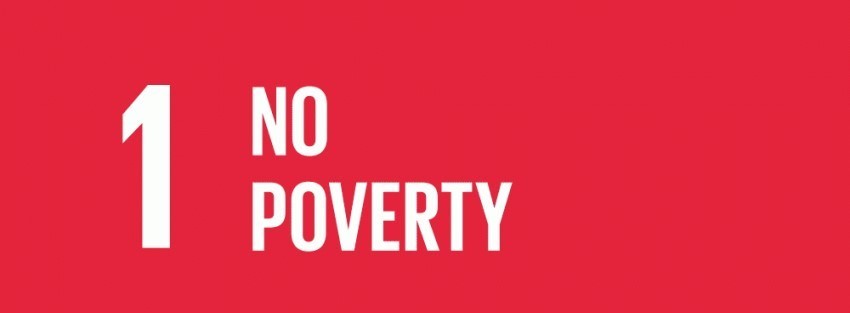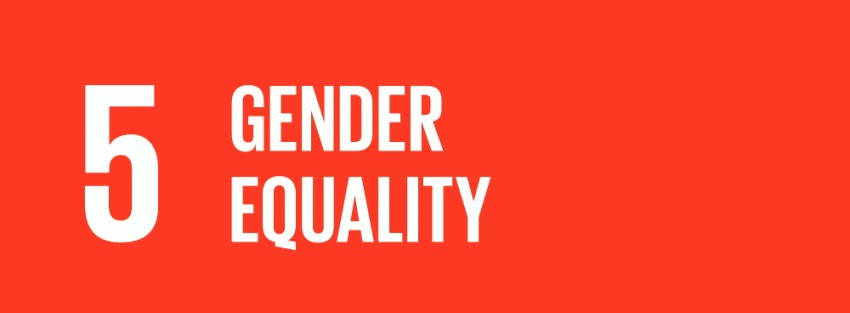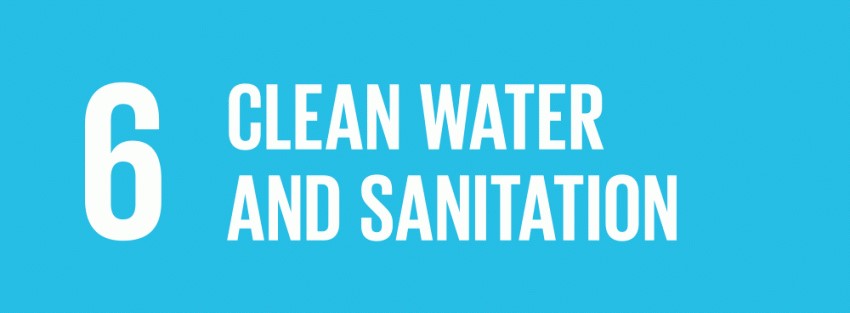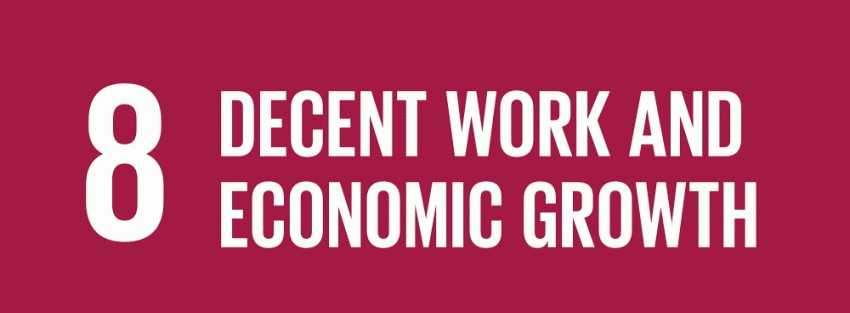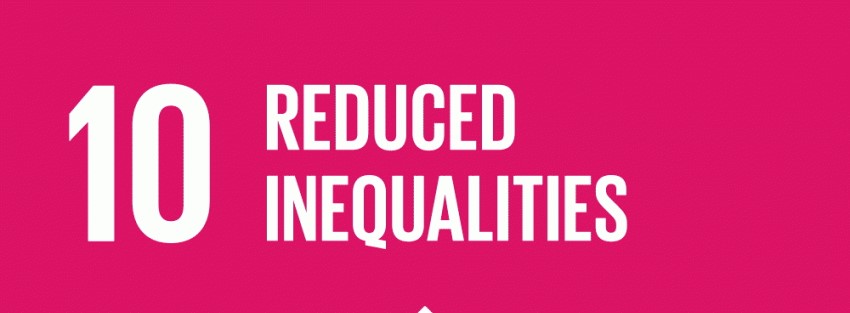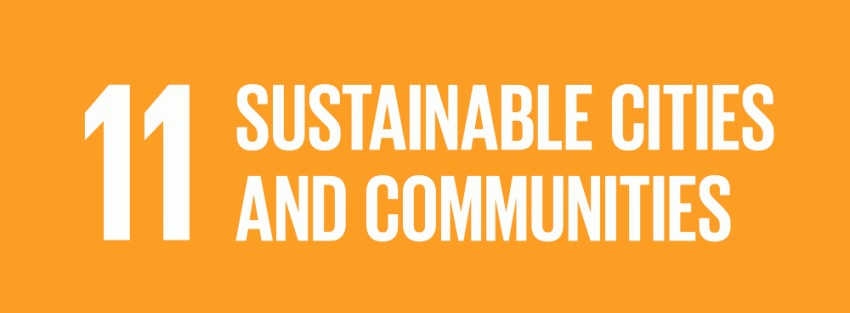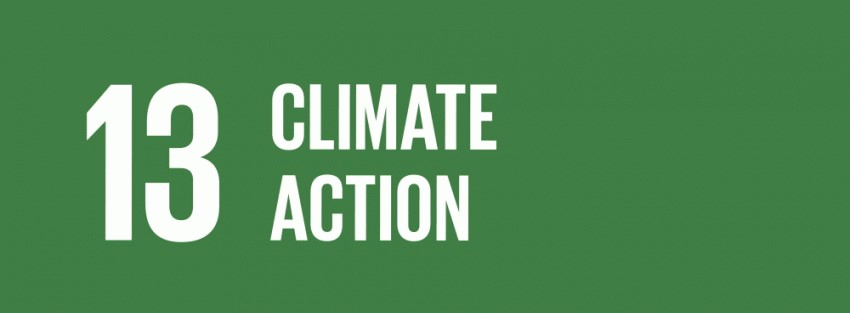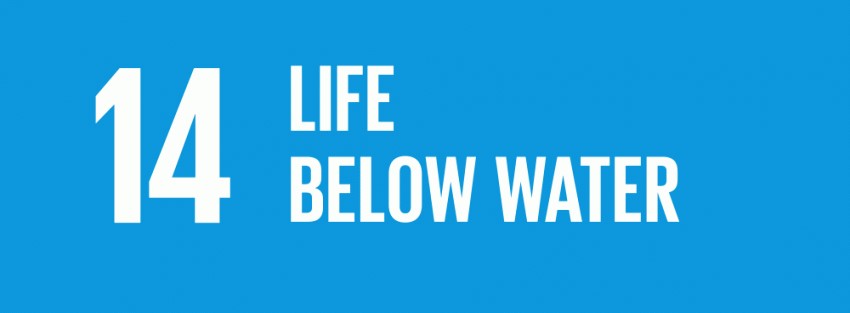SDG 16.2.6
Policy on supporting academic freedom
16.2.6 Does your university as a body have a policy on supporting academic freedom (freedom to choose areas of research and to speak and teach publicly about the area of their research)?
ADU Research Portal
https://www.adu.ac.ae/research-adu/home
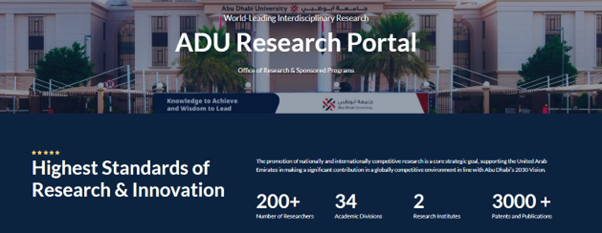
Research, Innovation and Impact
Abu Dhabi University is committed to the highest standards of research and innovation. The promotion of nationally and internationally competitive research is a core strategic goal, supporting the United Arab Emirates in making a significant contribution in a globally competitive environment in line with Abu Dhabi’s 2030 Vision to support the development of the knowledge economy.
Exceptional education and critical research to meet the pressing challenges of today's world.
The drive to address topics relevant to national development, and to support researchers in the production of knowledge and research-based problem solving, is at the heart of our research activity.
We endeavour to conduct research that is:
- Meaningful to the individual academic.
- Responsible and responsive to the needs of society.
- Creative, innovative, and academically-rigorous. ADU rewards risk-taking in the pursuit of excellence and offers the infrastructure to support this.
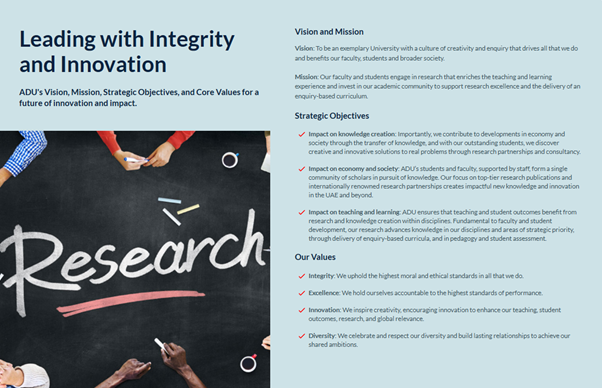
Strategic Goals
In achieving its mission, the ORSP provides, nurtures, and supports the research activities of Abu Dhabi University faculty and students. This includes assistance with grant proposal development, submission, and follow-up, as well as a commitment to the integration of research into teaching at both undergraduate and postgraduate levels.
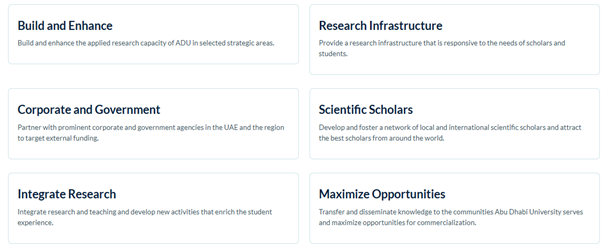
1. Faculty Research
1.1 Faculty members are encouraged to undertake research projects either individually or through teams of faculty members from different departments and/or colleges
1.2 All full-time faculty members are entitled to apply for research grants. Abu Dhabi University, through the Office of Research & Sponsored Programs, offers the following four types of grants:
a) Faculty Research Incentive Grant (FRIG)
b) Teaching & Learning Grant (TLG)
c) Action Research Grant (ARG)
d) Research Equipment Grant (REG)
Refer to the table below for rules related to all the Abu Dhabi University funded grants
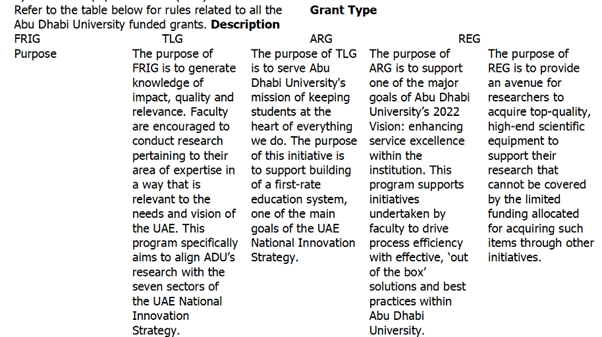
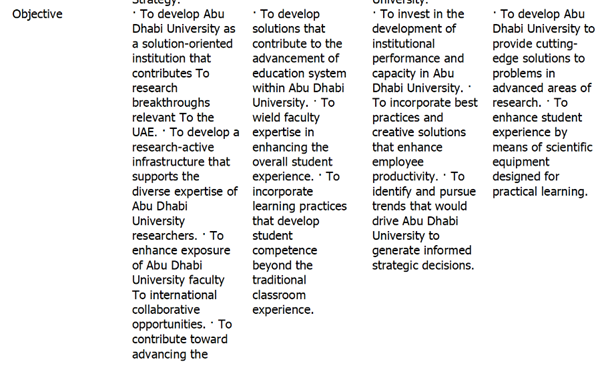
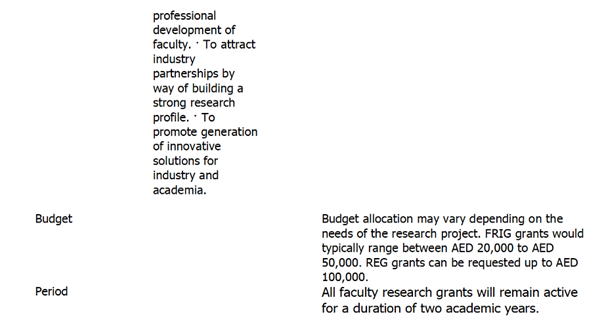
1.3 Call for proposals for faculty research grants would be announced at the start of every academic year. The results would be announced after evaluation rounds by December of every year.
1.4 A Principal Investigator (PI) may be involved in more than one internally funded project at a time in the same category. He or she shall be a PI in no more than two projects in an academic year and may serve as a Co-PI in multiple projects.
1.5 Transfer of funds from one category to another is allowed as long as it does not exceed 10% of the total budget. Any additional transfer should be approved by the Director of Research prior to fund utilization.
1.6 Requests for time extension are usually not granted but may be considered based on proven significant progress in research project.
1.7 Only one professional development travel effort may be funded under each research grant.
1.8 A progress report should be submitted to the Office of Research & Sponsored Programs at the end of every academic year. A project closing report should be provided by the end of funding grant award agreement.
1.9 In case of termination of faculty member’s contract with University, the research grant awarded to faculty would be terminated as well.
2. Undergraduate Student Research Grant
2.1 The purpose of this scholarship is to encourage and invoke a research mindset amongst students of Abu Dhabi University by providing funding for academic projects. This grant will enable students to access resources and necessary equipment without budgetary constraints.
2.2 To be eligible for this grant, a student must satisfy the following conditions:
2.2.1 Be a full-time student enrolled in an undergraduate program at Abu Dhabi University.
2.2.2 Should have obtained, over the last academic year, a cumulative GPA of 3.0.
2.2.3 Have the approval of a faculty member who is supervising and guiding the research work.
2.3 Each eligible student who is interested in applying for a grant should submit a research proposal describing the project scope and objectives, significance, timeframe for its execution and any anticipated expenses to the Office of Research & Sponsored Programs (ORSP).
2.4 The funding program is initiated at the Fall semester of every academic year.
2.5 Each grantee must submit a paper or project in the major field of study, which originated from an upper-level course or independent study course under the direction of an Abu Dhabi University faculty member.
Exceptions
For any conditions/circumstances and/or exceptions outside the conditions stated in this policy, a request shall be presented to the Board of Directors for decision.
Research-governance-and-Ethics-Policy
1. General Principles
Research integrity is fundamental to research communication and collaboration. Individuals engaging in research and scholarship should at all times, and without exception, adhere to the following basic integrity principles:
1.1 the highest professional standards in designing and conducting investigations are maintained;
1.2 a critical, open minded approach to research and scholarship and data analysis is upheld;
1.3 frankness and fairness with regard to the contribution of partners, competitors, and predecessors is protected; and
1.4 absolute honesty at all stages of enquiry is preserved, in particular, avoiding:
1.4.1 any form of fraud, such as fabricating or falsifying data or records;
1.4.2 piracy or plagiarism;
1.4.3 sabotaging the work, records or protocols of other researcher; and
1.4.4 breach of confidence as a reviewer or supervisor, and complicity in such actions by fellow researchers, as per the Research Misconduct Policy.
2. Academic Freedom in Research
2.1 A commitment to academic freedom is essential to the accomplishment of the overall mission of the University. By pursuing truth and its free expression, scholars and researchers advance and disseminate knowledge. In exercising their right to seek and communicate knowledge freely and openly, members of the academic community also have the responsibility to act in accord with the highest standards of integrity and in conformity with applicable professional and legal codes and legislation, as well as with University policies.
3. Principles of Sustainability
3.1 ADU is committed to a focus on sustainability in faculty and student research, and encourages innovation in creating original knowledge in ways of generating and acting on sustainable practices. Guided by the UN’s 2030 sustainable development agenda and its seventeen goals, the most significant impact that Abu Dhabi University can have in addressing sustainability results from equipping its students with knowledge of sustainability through its academic programs for their personal and professional lives, and also through the impact of the research
3.2 projects that are conducted by its faculty and students in its labs and research centers in
3.3 collaboration with national and international universities and research institutes.
4. Data Storage and Retention
4.1 The definition of “data” for the purpose of this policy encompasses the methodology used to obtain results, the actual research results, and the analysis and interpretations of results by the researchers.
4.2 Data must be recorded in a clear and accurate format. Particular attention should be paid to completeness, integrity and security of these records. Data will normally be held for a minimum period of five years from the date of publication. Data must be organized in a manner that allows ready verification. Original data should be authenticated, in order to protect the university and researchers against allegations of data falsification.
4.3 In the event of litigation, data and records should be accessible to the University and its legal advisors to determine their relevance.
4.4 Research data related to publications should be made available for discussion with other researchers, except where confidentiality provisions prevail. Confidentially provisions relating to research data and records shall apply in circumstance where the University or the researcher is bound by confidentiality agreements with third parties, disclosure would involve the unreasonable disclosure of information relating to the personal affairs of any person or confidentiality is required to protect intellectual property rights.
5. Confidentiality
5.1 Data will be considered confidential when:
5.1.1 A researcher has access informally to another researcher’s work either by way of, for example, discussion or sight plans, the researcher must first seek clarification from the originator regarding the nature and status of this information, i.e., is it confidential, before details or ideas can be discussed with another.
5.1.2 Individual researchers are required to sign a confidentiality agreement before commencing work on a project.
5.1.3 The data is personal information about an individual. If this kind of information is to be shared with another organization, the individual involved must complete a consent form.
5.2 When research is undertaken in accordance with a contractual agreement or under commercial sponsorship, the ownership of research data and records and responsibilities should be determined prior to commencement of the research contract and should be specified in the research contract.
6. Authorship
6.1 Abu Dhabi University upholds and supports the notion that publication of research results and other scholarly work is an intrinsic part of any research endeavor. Publication and authorship must be approached in a responsible manner, adhering to ethical principles and internationally accepted standards.
6.2 There should be no limitations or restrictions as to public disseminations of results of any project affiliated in any way with Abu Dhabi University, whether financed with national funds or from grants from private organizations.
6.3 Authorship rules are detailed below.
6.3.1 Authorship: A person claiming to be an author of a scholarly publication must meet the following criteria: (a) the person in question has participated substantially to the conception and design of the study, or to the analysis and interpretation of data; (b) the person in question has participated substantially in the drafting of the manuscript or in the substantive editing of the manuscript; (c) the manuscript to be published has received final approval from the publisher; and (d) the person in question can explain and defend the study in public or scholarly settings.
6.3.2 Acknowledgment: Contributions that do not justify authorship should be acknowledged separately in the notes to the manuscript. Example contributions of this type may include general supervision of a research group, assistance in obtaining funding, or technical support.
6.3.3 Honorary Authorship: This type of authorship, which would apply to persons who may have been associated in some way with a study but do not meet the four criteria of the authorship is discouraged and may, in fact, constitute an unethical research practice.
6.3.4 Graduate Student Authorship: Faculty should be especially aware of their responsibility to safeguard the rights of graduate students to publish the results of their research.
6.3.5 Senior Author and Order of Authorship: The senior author is generally defined as the person who leads a study and makes a major contribution to the work. All the authors at the outset of a project should establish senior authorship, preferably in a written memorandum of understanding. This memorandum of understanding should reference the authors’ agreement to abide by their departments’ policy(ies) on authorship or the University policy on authorship. At the outset of a study, the senior author should discuss the outline of work and a tentative order of authorship with the study participants. As projects proceed, agreements regarding authorship may need to be changed. It is the responsibility of the senior author to assure that the contributions of study participants are properly recognized.
6.3.6 Disputes Over Authorship: Disagreements over authorship, e.g. who has a right to be an author or the order of authorship, should be resolved by the senior author in collegial consultation with the other authors.
7. Intellectual Property Rights
7.1 The establishment and use of intellectual property must not conflict with obligations under the University’s Conflict of Interest Policy. Intellectual property rights conform to the UAE and international laws and regulations.
7.1.1 Unless otherwise specified, the copyright of materials created by an employee within the scope of employment are owned by the employer. The University retains a perpetual, non-exclusive, royalty-free, irrevocable license to any documents, such as documents submitted to regulators and accrediting bodies, for the purpose of continuing to teach any course of instruction for which the documents were prepared with the right to revise and update them as required for this purpose.
7.1.2 Copyright to personal work created outside the scope of University employment which do not use University resources are owned by the creator.
7.1.3 ADU does not claim copyright ownership to written work by academic and non-academic personnel, for the purpose of scholarly research, such as journal publications, conference proceedings and scientific books.
7.1.4 ADU does not claim copyright ownership of musical, artistic, or imaginative work produced and/or composed by academic and non-academic personnel, with the exclusion of potential work being an IP asset.
7.1.5 The University will own copyright, including teaching materials, in any of the scenarios listed below:
7.1.6 Commissioned for University purposes which are produced by individuals not employed at the University, or by University employees outside their regular University employment.
7.1.7 Created by an employee of the University hired with the specific responsibility of producing the materials. Sponsored works first produced by, or through, the University in the performance of a written agreement between the University and a sponsor: internal grants where work is created as a result of an agreement between the University and the creator(s) of the work, or external grants where work is created as a result of an agreement between the University and external sponsor. If rights to copyrightable material from a sponsored project are shared, the copyrightable material should be specified in the written sponsored agreement. This provision does not apply to grants to perform research where the production of intellectual property is ancillary to the purpose of the grant.
7.1.8 Created with the use of additional university resources which are specifically provided to support the production of the IP materials.
7.1.9 The creator received special or additional compensation to create the IP material beyond their regular salaried appointment.
7.2 With reference to 7.5.3., additional University resources includes the dedicated allocation of resources not routinely available to faculty for the production of copyrightable/IP material such as the development of e-learning
courses and programs requiring co-development with, but not limited to, multimedia and technology support staff, videographers and instructional designers. Credit hour reduction in teaching loads specifically for the purpose of
developing copyrightable/IP materials is considered additional university resources. It does not include resources normally made available to faculty such as routine secretarial support, or library resources.
7.3 Ownership of copyrights to contracted facilities work, produced by non-university personnel or University employees acting outside the scope of their employment, shall be governed by a written agreement permitting the use of
specific University facilities which may specify the ownership of resulting copyrights rests with the University, or the University may be paid a fee for use of the facility.
7.4 In general, a registered student at ADU creating any copyrightable works will be entitled to ownership given the student has not used resources in excess of those available to them as an enrolled student with the University, excluding financial aid, with the exemption that the work was not completed under conditions outlined in 7.5.1.to 7.5.4.
Further detail is provided in ADU’s Intellectual Property Policy.
8. Publication
8.1 When publishing research, all reasonable steps must be taken to ensure that published reports, statistics and public statements about research activities and performance are complete, accurate and unambiguous.
8.2 Deliberate inclusion of inaccurate or misleading information relating to research activity in curriculum vitae, grant applications, job applications or public statements, or the failure to provide relevant information is a form of research misconduct.
8.3 Publication of multiplier papers based on the same set(s) or sub-set(s) of data is not acceptable, except where there is full cross-referencing within the papers. An author who submits substantially similar work to more than one publisher must disclose this to the publishers at the time of submission.
THE OFFICE OF RESEARCH AND SPONSORED PROGRAMS
https://cdn.adu.ac.ae/images-container/docs/default-source/catalogs/pg-catalog-22-23.pdf
I. Research Objectives:
Abu Dhabi University (ADU) is a research-active university, playing a distinctive role in the development and application of research-informed knowledge and innovation in the Gulf region. ADU is committed to innovative research that is world class in terms of originality, significance and potential impact.
ADU recognizes that its ability to compete in an increasingly competitive higher education market will depend largely on its academic reputation, ranking and on gaining quality accreditation. Research is key to all three of these areas. High quality ranking, academic reputation and accreditation cannot be achieved without strong scholarship and research.
Research is a core pillar in ADU’s 2022-2027 Research, Innovation and Impact strategy. It clearly articulates our commitment to supporting further development of the knowledge-economy, and the process of research as a pedagogic enabler by which students develop their 21st Century work skills. The principal objectives of ADU’s research strategy are:
• Have an impact on knowledge creation
• Have an impact on the economy and society
• Have an impact on teaching and learning
II. Research Vision & Mission:
Vision
To be an exemplary university with a culture of creativity and enquiry, recognized for producing the highest quality research and influencing policy and practice for the benefit of society and our globally connected economy.
Mission
To provide opportunities for students and faculty to engage in research activities that enrich the teaching and learning experience and invest in our academic community to support research excellence and the delivery of an enquiry-based curriculum.
III. Research Structure:
Research activities at ADU are managed by the Office of Research and Sponsored Programs (ORSP), which is headed by the Associate Provost for Research & Academic Development. The ORSP serves as the focal point for all research activities and policies, as well as external and internal communications related to research.
The Office of Research and Sponsored Programs
The Office of Research and Sponsored Programs (ORSP) oversees all research activities at ADU. It provides the overall infrastructure and administers faculty & student research funding programs.
ORSP Services
The ORSP provides many services that focus on increasing research productivity among faculty and students, including:
• Implementing the research, innovation and impact strategy.
• Managing and administering all aspects of university-funded initiatives to support research.
• Managing and facilitating student-centered research initiatives including the Undergraduate Research Fund.
• Promoting and managing Intellectual Property as well as facilitating filing and prosecution of patent applications by
ADU researchers.
• Planning and organizing the annual Undergraduate Research Competition.
• Administering faculty consultancy agreements with external organizations including industrial partners.
• Delivering research capacity building initiatives.
• Monitoring, tracking and reporting the research performance at Abu Dhabi University to a range of internal and external stakeholders.
• Managing the life cycle of external grants from application to approval, and provides post-award compliance analysis and reporting.
• Overseeing the Institutional Review Board (IRB) for Human Subjects activities.
IV. Research Support for Faculty:
Research initiatives provide faculty with funding to support research projects and a culture of research excellence at Abu Dhabi University. These funding programs are an enabler for faculty to produce outputs aligned with the Leadership and Research, Innovation and Impact promotion route in the faculty development framework. Research collaboration is also an important KPI for the Ministry of Education’s Higher Education Excellence Framework:
Internal
1. Research, Innovation and Impact Grant
The purpose of this grant is to provide seed funding to support faculty to conduct research in their area of expertise which contributes to the University achieving its research and innovation strategic objectives outlined in our Research, Innovation and Impact Strategy.
2. Teaching Scholarship and Institutional Effectiveness
Teaching Scholarship and Institutional Effectiveness grants provide funding to support faculty to conduct pedagogy research focusing on student learning and success, and institutional effectiveness in terms of quality assurance and enhancement to ensure the continuous improvement of student learning.
External
Various opportunities prevail throughout the academic year which encompass external entities awarding ADU faculty members with an award amount to conduct research. The awardees are selected based on originality, outstanding quality, practicability, qualifications of the researchers, and the strength & relevance to the entity’s research agenda. The two most notable funding initiative cycles are run annually by ASPIRE at the Advanced Technology Research Council (ATRC).
1. Abu Dhabi Award for Research Excellence (AARE)
2. Abu Dhabi Young Investigator Award (AYIA)
V. Research Support for Students:
Research activities by students are supported through the following types of projects that are managed by the ORSP:
1. Undergraduate Research Scholarship
This scholarship aims to develop research skills among ADU’s top students and to contribute to ADU’s commitment toward Abu Dhabi’s vision of a knowledge-based economy. The aim of the scholarship is to foster undergraduate research and encourage our undergraduate students to engage in research at early stages of their academic careers to enhance employability opportunities. This scholarship is granted to students who submit high-potential research proposals to the ORSP and demonstrate an excellent academic record.
2. Undergraduate Research Competition
ADU’s Office of Research annually organizes the GCC and MENA regionwide Undergraduate Research Competition (URC). This competition aims at encouraging universities to promote scientific research among undergraduate students and to
make it an integral part of university education, given the significance of scientific research in advancing the country to the top ranks. Participating in this competition provides students with a great opportunity for competitive interaction with students from other universities. Additionally, the competition serves to strengthen critical and analytical thinking skills among undergraduate students and to enhance students’ confidence in their research abilities, to explore new frontiers in their fields of study and to prepare them for graduate level studies. The competition is the first and the largest such event in the GCC and MENA region comprising all universities and all major disciplines.
Office of Research and Sponsored Programs (ORSP)
https://www.adu.ac.ae/research/research-at-adu/overview
Abu Dhabi University is committed to the highest standards of research and innovation. The promotion of nationally and internationally competitive research is a core strategic goal, supporting the United Arab Emirates in making a significant contribution in a globally competitive environment in line with Abu Dhabi’s 2030 Vision. The drive to address topics relevant to national development, and to support researchers in the production of knowledge and research-based problem solving, is at the heart of our research activity.
We endeavour to conduct research that is:
- Meaningful to the individual academic.
- Responsible and responsive to the needs of society.
- Creative, innovative, and academically-rigorous. ADU rewards risk-taking in the pursuit of excellence and offers the infrastructure to support this.
Build a reputation as a research-oriented university
The Vison
The ORSP was created to help Abu Dhabi University expand its research activities and build a reputation as a research-oriented university recognized nationally, regionally, and internationally.
The Mission
The mission of the ORSP is to pursue excellence in selected strategic areas of applied research and innovative scholarly pursuits compatible with the socio-economic needs of the UAE. The ORSP seeks strong partnerships with scientific, corporate, and government agencies to identify and explore strategic areas of research. Emerging strategic research areas for the University and the country include, but are not limited to, renewable energy, desalination, environmental science, entrepreneurship, empowerment of women, technology and innovation.
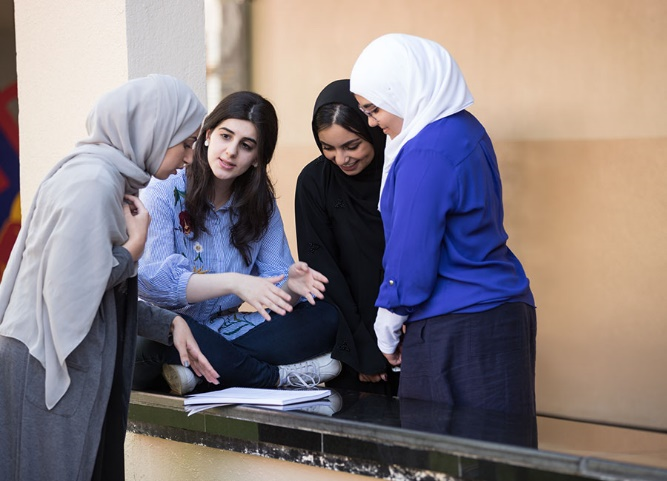
This mission will be achieved through the use of the exceptional talents of research scholars – both professors and students - to extend the boundaries of human knowledge and to use these discoveries to understand and resolve present and future challenges to humanity and the environment.
In achieving its mission, the ORSP provides, nurtures, and supports the research activities of Abu Dhabi University faculty and students. This includes assistance with grant proposal development, submission, and follow-up, as well as a commitment to the integration of research into teaching at both undergraduate and postgraduate levels.
The research mission of Abu Dhabi University is fulfilled through the following:
- Attracting, nurturing, retaining, and promoting outstanding research scholars.
- Recruiting the best and brightest graduate students.
- Leading in undergraduate education through the inspired application of research.
- Providing exceptional capacity and opportunities for individuals and teams to develop excellence in basic and applied research.
- Fostering commercialization of applied research endeavours to the benefit of Abu Dhabi, the United Arab Emirates, and the international community.
- Demonstrating research achievements for the benefit of society through diverse academic and non-traditional means of communication
 |
Internationally competitive research
Strategic Goals
The goals of the ORSP are to:
- Build and enhance the applied research capacity of ADU in selected strategic areas.
- Provide a research infrastructure that is responsive to the needs of scholars and students.
- Partner with prominent corporate and government agencies in the UAE and the region to target external funding.
- Develop and foster a network of local and international scientific scholars and attract the best scholars from around the world.
- Integrate research and teaching and develop new activities that enrich the student experience.
- Transfer and disseminate knowledge to the communities Abu Dhabi University serves and maximize opportunities for commercialization.
Research Strategy and Related Policies
VISION
To be an exemplary university with a culture of creativity and enquiry, recognized for producing the highest quality research and influencing policy and practice for the benefit of society and our globally connected economy.
MISSION
To provide opportunities for students and faculty to engage in research activities that enrich the teaching and learning experience and invest in our academic community to support research excellence and the delivery of an enquiry-based curriculum.
VALUES
ADU’s research strategy embodies the values of Excellence, Collaboration, Innovation, and Relevance. These values are supported and highlighted by our vision and mission, drive our strategic goals, and are in full alignment with the institutional values.
Excellence:
We actively aim to produce the highest quality research to ensure impactful contributions to the knowledge-based economy of the UAE.
Collaboration:
We encourage and support research that involves scholars from across disciplines and connects the University with researchers across the nation and the globe.
Innovative:
We actively promote innovation through research that shapes and improves teaching and learning and promotes knowledge transfer within and outside the University.
Relevance:
We prioritize and support research relevant to the ADU community and the UAE national agenda, to benefit the University and the broader community.
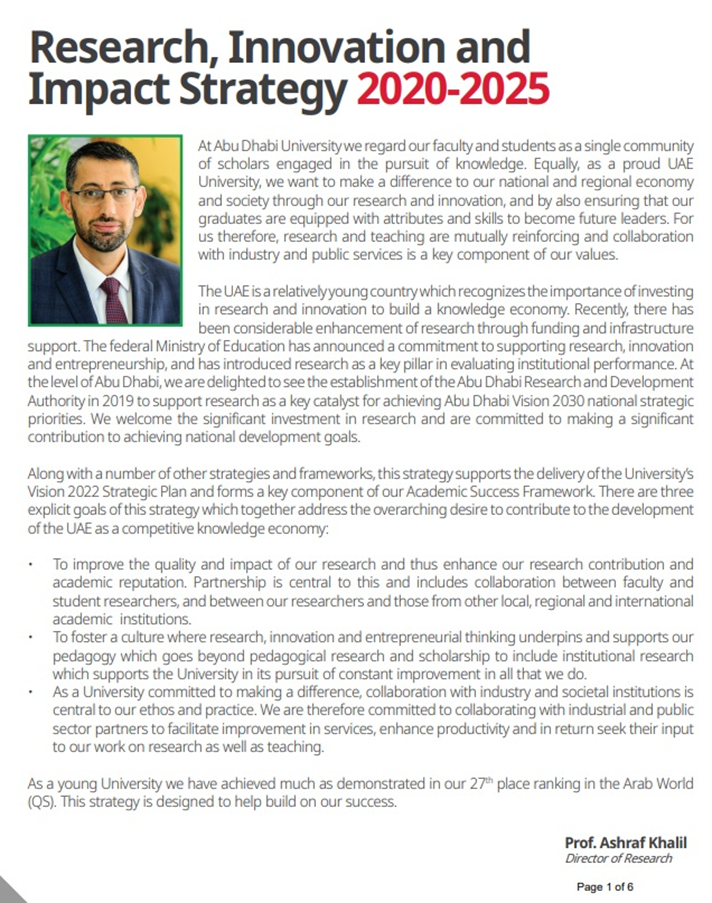
Sustainable Development Goals (SDGs)
Abu Dhabi University is committed to becoming the best institution of its kind in the region. We are a private, multi-campus university committed to meeting the education, skills and knowledge needs in the United Arab Emirates and neighbouring countries through qualifications and standards that are respected across the world.
01
No Poverty
Sustained economic growth cannot be achieved without social inclusion as the whole of society has a role to play in the development of a country. Federal Law No. 13 of 1972 and its amendments by the law (No.2) in 2001 was issued by the Ministry of Community Development.
Introduction
Sustained economic growth cannot be achieved without social inclusion as the whole of society has a role to play in the development of a country. Federal Law No. 13 of 1972 and its amendments by the law (No.2) in 2001 was issued by the Ministry of Community Development.
(MOCD) as the first law to provide social benefits to members of the community to ensure and sustain the high quality of living for all UAE citizens. The Ministry continues to work today on enhancing social inclusion for all members of society where social benefits are extended to cover twenty-one segments of the community.
The UAE government has a future vision to change the culture of social support from the current ‘social welfare’ model to ‘sustainable social development’ that encourages independence and growth of families across the UAE.
ADU is determined to overcome all challenges that ADU and our students might face as a result of the poverty. We continue to be dedicated to empowering and inspiring outstanding students to pursue their goals. Our scholarships and financial aid programs are available to all students who want to fund their academic programmes. We consider it our duty to provide equal opportunities to students interested in pursuing higher education, enabling them to contribute to society regardless of their financial situation.
In additional to financial aid, ADU scholarships are being provided to outstanding students, through seven main categories, including the Sheikh Hamdan Bin Zayed Scholarship, the President’s Scholarship, the University Scholarship, the Academic Scholarship, the Athletic Scholarship, the Alumni Scholarship, and the Family Tuition Waiver.
We take pride in attracting the brightest students in the UAE and offer them generous support, to excel in their studies. Our Scholarship and Financial Aid programmes are part of ADU’s corporate social responsibility and are influenced by the UAE’s great leadership. ADU is constantly finding pioneering and innovative ways to support and facilitate the needs of our students to help them achieve their academic degree.
Emirates Red Crescent and ADU Launch a Humanitarian Funding Campaign
Emirates Red Crescent and Abu Dhabi University recently launched the Education Support Campaign in coordination with Abu Dhabi Cooperative Society and Lulu Group International. Through this collaboration, ADU and Emirates Red Crescent will support disadvantaged students in their university studies, providing them with an opportunity for a successful educational journey. The campaign aims to raise 10 million dirhams, and students will benefit from these funds starting 24 November 2021 and for one year. (This activity is licensed by the Department of Community Development – Abu Dhabi, permit number 022).
Abu Dhabi Cooperative Society and Lulu Group International will aid the campaign by facilitating donations through their different points of sale. Community members will show their solidarity by donating valuable aid to students, starting at two dirhams.
Public donations will be accepted via text message through Etisalat and Du. Bank donations can be sent to Sharjah Islamic Bank - account number (11445518006), IBAN (AE350410000011445518006). Individuals can also donate through the link provided on the Emirates Red Crescent website (https://www.emiratesrc.ae/eduadu), with the donations ranging from ten dirhams to 1,000 dirhams.
H.E. Salem Al Rayes Al Ameri, Deputy Secretary-General for Local Affairs at Emirates Red Crescent, said, "Sponsoring students is one of the permanent and continuous programs within the initiatives of the Humanitarian and Development Authority. We continue to witness a high rate of response and generosity from sponsors and benefactors. These donations are considered a true embodiment and reflection of the authority's efforts to invest in empowering individuals and guiding them towards achieving their aspirations and fulfilling their dreams."
Al Ameri added, "The Authority acknowledges the important role it plays in preparing future generations for the responsibilities of tomorrow."
Al Ameri praised the existing cooperation between the Emirates Red Crescent and Abu Dhabi University, which seeks to support education and provide opportunities to disadvantaged students whose family circumstances prevent them from continuing their educational path. The cooperation embodies Abu Dhabi University's commitment to fulfilling its social responsibility, as well as its leading academic role in advancing science and education as the most important pillars of human development in the country. He also praised the role of the Abu Dhabi Cooperative Society and Lulu International Group in supporting the activities of the campaign.
Salem Mubarak Al Dhaheri, Executive Director of Community Relations at Abu Dhabi University, said, "Abu Dhabi University is proud of its strategic partnership with Emirates Red Crescent in launching the Education Support Campaign. The campaign aligns with Abu Dhabi University's mission to support students and allows us to share social responsibilities with the community. We are proud of the continuous cooperation and renewed partnership with Emirates Red Crescent in launching campaigns that carry a noble message and achieve a tangible and real impact on our society."
Al Dhaheri added, "Abu Dhabi University appreciates the role of the Abu Dhabi Cooperative Society, Lulu International Group, and all participating partners in supporting the campaign activities. Investing in our young people and building an educated generation capable of leading the continued development of our country is vital."
Abdul Majeed Al Khouri, the Executive Director of the Abu Dhabi Cooperative Society, commented, "Our participation in the Education Support Campaign confirms the depth of the decades-old relationship between the Abu Dhabi Cooperative Society and Emirates Red Crescent. With God's grace, it has gone beyond humanitarian work and now encompasses sustainability. We are proud of this pioneering partnership. The Abu Dhabi Cooperative Society has always sought to serve the community of the UAE and we continuously contribute to helping and supporting various sectors in Abu Dhabi and the other Emirates."
Al Khoori added, "The initiatives adopted by the Abu Dhabi Cooperative Society reflect our passion towards aiding societal struggles related to education. Abu Dhabi Cooperative Society has initiated partnerships with ministries and governmental institutions, such as the Ministry of Social Affairs and the Emirates Red Crescent, to create opportunities for those who dream of pursuing their educational journey. In the last few years, we doubled our efforts and developed initiatives that will allow us to serve our country and consolidate the concept of social responsibility. We are proud to be part of an institution that provides its students with an environment that values charitable work and social development while simultaneously providing high-quality education and academic qualifications that are respected worldwide."
Mr. Aboobakker TP, Director of LuLu Hypermarkets Abu Dhabi and Al Dhafra region, said, "This initiative embodies the belief and commitment of LuLu Group in the bright future of the UAE and the power of the Emirati youth to shape it."
"Education is one of the strongest building blocks for a nation's future, and LuLu Group is honored to share in raising valuable funding for needy students," he continued. "It empowers Emirati youth to contribute to their best potential and lead the future of the country. It is particularly timely that this campaign comes on the eve of the 50th anniversary of the UAE's nationhood. We at LuLu Group International are proud of our identity as a 'homegrown' UAE brand and see this participation in the 'Let's Support Their Future' campaign as our humble contribution to the nation that gave us so much to build upon."
Sustainable Development Goals (SDGs)
Abu Dhabi University is committed to becoming the best institution of its kind in the region. We are a private, multi-campus university committed to meeting the education, skills and knowledge needs in the United Arab Emirates and neighbouring countries through qualifications and standards that are respected across the world.

